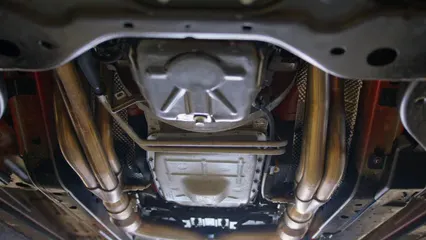
Why Does My Car Smell Like Rotten Eggs?
Introduction
Have you ever noticed a strange, sulfur-like odor in your car? This unpleasant smell, often described as rotten eggs, can be alarming. It’s crucial to address unusual car smells quickly. Ignoring them can lead to safety risks and costly repairs. In this article, we will discuss the reasons behind the rotten egg smell, its implications, and how to fix the issue.
Speaking of safety, every car owner should have a First Aid Kit for Cars on hand. You never know when a minor mishap might occur, and having the right supplies can make all the difference!
Summary and Overview
Identifying the rotten egg smell in your vehicle is essential. This odor often signals underlying mechanical problems. Common sources include the catalytic converter and battery issues. Ignoring these signs may lead to severe damage and safety hazards. Throughout this article, we will outline the primary causes of this smell and the steps you can take to resolve the issues effectively.

And while we’re at it, don’t forget to keep your car clean! A set of Car Cleaning Supplies can help maintain that fresh scent and prevent odors from taking over your ride.
Common Causes of Rotten Egg Smell
1. Faulty Catalytic Converter
The catalytic converter plays a key role in your vehicle’s exhaust system. It helps convert harmful emissions into less toxic substances. When this component malfunctions, it can cause the buildup of hydrogen sulfide. This gas is notorious for producing that rotten egg smell.
A failing catalytic converter may present several symptoms. You might notice reduced engine performance, unusual noises, or warning lights on your dashboard. If you experience these signs, it’s crucial to have your vehicle inspected.
Repairing a catalytic converter can be costly. On average, replacing one may set you back around $433.80, depending on your vehicle’s make and model. Catalytic converters generally last between 10 to 15 years, but factors like driving habits and maintenance can affect their lifespan.
If you detect the rotten egg smell while driving, it’s essential to check your catalytic converter. Don’t wait for the problem to escalate. Addressing it promptly can save you time and money in the long run.

Additionally, if you want to keep your catalytic converter in check, consider using a Catalytic Converter Cleaner. This can help maintain its efficiency and prevent those nasty odors from creeping in!
2. Leaking Car Battery
Have you noticed a sulfur-like odor near your car battery? This smell often signals a leaking lead-acid battery. When a battery leaks, it emits hydrogen sulfide gas, which has a distinct rotten egg smell. This issue can arise from overcharging or physical damage to the battery.
Leaking batteries can pose several dangers. Hydrogen sulfide is toxic, and exposure can lead to health issues. Short-term exposure may cause nausea, headaches, or throat irritation. Prolonged exposure can lead to more severe health problems. It’s vital to take this smell seriously.
So, how can you identify a leaking battery? Start by inspecting the battery for any visible signs of damage or corrosion. Look for a swollen case or fluid leakage around the terminals. If the area smells strongly of rotten eggs, this is a clear indicator of battery trouble.
Handling battery issues requires caution. Always wear Automotive Safety Goggles when inspecting or working with batteries. If you suspect a leak, it’s best to avoid driving the vehicle until it is checked. A professional mechanic can safely assess the situation and provide guidance.
When it comes to replacement options, car batteries typically last about three to five years. If your battery is older and showing signs of leakage, it may be time for a replacement. On average, a new lead-acid battery costs around $225.93, depending on the type and brand.

Regular battery maintenance can help prevent leaks. Keep your battery clean and dry, and check the connections frequently. Overcharging can be avoided by ensuring that the alternator is functioning correctly.
If you detect that rotten egg smell, don’t ignore it. Inspect your battery as soon as possible. This proactive approach can help you avoid more significant issues down the road. Your safety and the health of your vehicle depend on it.
4. Old or Contaminated Transmission Fluid
Have you noticed that rotten egg smell in your vehicle? It might not just be the food leftovers from last week. Sometimes, the culprit is your transmission fluid. Old or contaminated transmission fluid can emit a sulfur-like odor when it overheats. This smell often resembles rotten eggs and indicates that it’s time for some maintenance.
So, what causes this odor? As transmission fluid ages, it loses its effectiveness. It can become contaminated with debris or break down due to heat. When this occurs, it may not lubricate your transmission properly. Consequently, overheating can happen, resulting in that unmistakable smell.
Regularly changing your transmission fluid is crucial. It not only helps maintain vehicle performance but also extends the life of your transmission. Many experts recommend changing the fluid every 30,000 to 60,000 miles. However, always check your owner’s manual for specific recommendations.

And if you’re looking for an easy way to do it yourself, consider a Transmission Fluid Change Kit. This kit can help you get the job done right and keep your transmission in top shape!
But how can you tell if your transmission fluid is in bad shape? There are a few signs to watch for. First, if the fluid appears dark or has a burnt smell, it’s a clear indicator. Second, if you notice slipping gears or delayed shifts, these are warning signs that your transmission needs attention. Regular inspections can help catch these issues early.
Let’s talk about maintenance schedules. Following a consistent schedule for fluid replacement can save you from costly repairs down the line. Ignoring these changes can lead to serious transmission damage. Repairing a transmission can cost anywhere from $1,000 to $5,000, depending on the issue. Regular fluid changes, typically costing between $150 and $200, are a much smarter investment.
The takeaway? Don’t overlook your transmission fluid. A simple check can prevent that rotten egg smell and keep your vehicle running smoothly. Make it a habit to inspect the quality and levels of your transmission fluid regularly. Your car – and your nose – will thank you later!
5. Other Possible Sources
While the transmission fluid is a common cause of that rotten egg smell, it’s not the only one. Odd odors can stem from various sources in your vehicle. Let’s explore some less common culprits.
First, have you checked for forgotten food or spills? It’s easy to overlook crumbs or containers tucked away in the back seat. If something perishable is left behind, it can decompose and create a foul odor. A thorough cleaning can often resolve this issue.
Another possible source is mold or mildew in the air conditioning system. If you notice a musty smell, that’s your cue to clean or replace the cabin air filter. Regular maintenance of your AC system is essential to prevent mold growth.

Lastly, consider the possibility of a decomposing animal in your vehicle. Small critters may find their way into the engine bay or air ducts. If this is the case, you’ll need to locate and remove the source. This situation can be quite unpleasant, but it’s important to address it promptly.
Identifying these sources can save you from more significant issues down the road. Regular vehicle cleaning should be part of your maintenance routine. It’s not just about aesthetics; it’s crucial for vehicle hygiene too.
So, keep your car clean and fresh. Regularly inspect your vehicle for unwanted items and odors. By doing so, you can avoid the unpleasant smells that come from decomposing organic matter or forgotten snacks. Your nose will appreciate it!
Conclusion
The rotten egg smell in your car can arise from various sources. A faulty catalytic converter is often the main culprit, as it fails to process harmful gases effectively. Leaking car batteries and old transmission fluid can also contribute to this unpleasant odor. Each of these issues requires prompt attention to prevent further damage to your vehicle.
If you notice this smell, don’t wait. Addressing it quickly may save you from costly repairs and ensure your safety. Regular vehicle maintenance is key to preventing future occurrences of this odor. Routine checks can help you catch problems before they escalate.

Your car deserves the best care, so stay vigilant! And while you’re on top of your maintenance, consider using a Automotive Diagnostic Scanner to help you identify any issues before they become a real problem!
FAQs
Is the rotten egg smell in my car dangerous?
Yes, it can pose health risks. Hydrogen sulfide, present in the odor, can cause nausea or headaches with short-term exposure.
How can I get rid of the rotten egg smell in my car?
Check and repair the catalytic converter and inspect the battery for leaks.
Can a bad catalytic converter cause a rotten egg smell?
Absolutely! A malfunctioning catalytic converter often leads to this odor.
What should I do if the smell persists after repairs?
Look for lingering odors in the cabin air filter or vent system. Cleaning or replacing these components may help.
How often should I maintain my car to prevent smells?
Regular car maintenance is crucial for avoiding unpleasant odors, including that dreaded rotten egg smell. A good rule of thumb is to follow a maintenance schedule based on your vehicle’s make and model. Generally, you should aim for the following: Oil Changes: Every 5,000 to 7,500 miles, or as recommended in your owner’s manual. Fluid Checks: Monthly inspections of transmission, brake, and coolant fluids. Air Filter Replacements: Every 12,000 to 15,000 miles to keep air quality fresh. Battery Inspections: Twice a year to check for leaks or corrosion. Brake Checks: Regular inspections every 10,000 miles or when you notice changes in performance. By sticking to these guidelines, you can help ensure your vehicle runs smoothly and smells pleasant.
Can poor fuel quality cause a rotten egg smell?
Yes, poor fuel quality can indeed contribute to that unpleasant rotten egg smell. Low-quality fuel may contain higher sulfur levels, which release a distinctive odor when burned. This smell can become more pronounced if your engine runs inefficiently. To avoid this issue, always opt for high-quality fuel from reputable stations. Premium fuels often have additives that help reduce emissions and keep your engine clean.
What are the signs of a failing catalytic converter?
A failing catalytic converter can lead to several noticeable symptoms. Here are the key signs to watch for: Reduced Engine Performance: You may notice sluggish acceleration or a decrease in power. Warning Lights: The check engine light may illuminate on your dashboard. Unusual Smells: A strong rotten egg odor can indicate issues with the converter. Exhaust Issues: You might see increased emissions or hear unusual noises from the exhaust system. If you experience any of these signs, it’s vital to consult a mechanic. Addressing catalytic converter problems early can save you from costly repairs down the line.
Please let us know what you think about our content by leaving a comment down below!
Thank you for reading till here 🙂 And don’t forget to grab a Emergency Roadside Kit for peace of mind during your travels!
All images from Pexels




